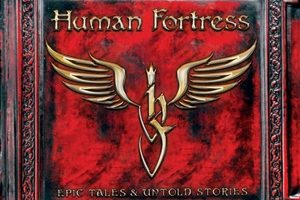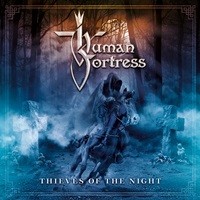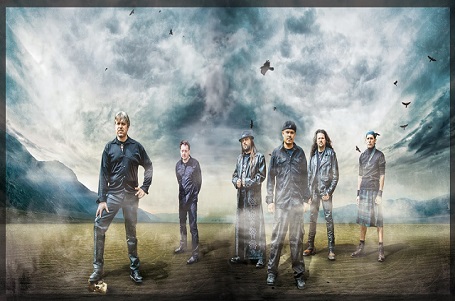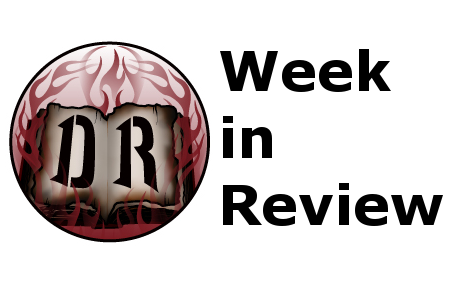Human Fortress – Another Power Reign
Thursday, 2nd January 2020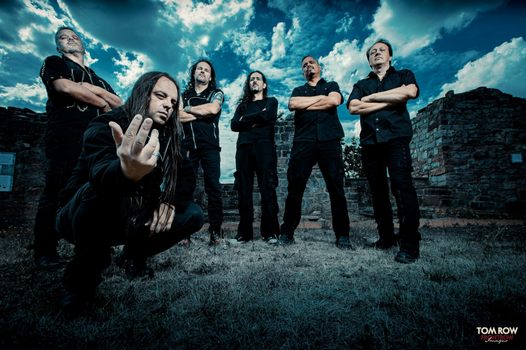
There’s something to be said for efficiency and consistency. When it comes to German power metal band Human Fortress, it’s evident that the sextet knows how to develop material that appeases their creative desires and also satisfy their loyal following. Especially considering the band’s lineup hasn’t varied over the past seven years, their sixth studio record Reign of Gold delivers sterling anthems of varying tempos, occasionally veering into dramatic/ theatrical terrain a la Kamelot for “Lucifer’s Waltz” or a Dio/Rainbow style effort with “Surrender”.
We reached out to vocalist Gus Monsanto through Skype – and after a few misfires, technology ended up working out to have this discussion. You’ll learn more about the latest producer working with the band, how they are able to work together considering the cross-continental positioning of Gus compared to his bandmates, and healthy discussion on some of his favorite musical moments in his lengthy career.
Dead Rhetoric: You’ve now been a part of Human Fortress since 2013, with Reign of Gold being your third album with the band. How do you assess your time with the group, and what do you believe you bring to the table that differs from their previous singer Jioti Parcharidis?
Gus Monsanto: Right now, I feel completely at home with those guys. They are excellent people, great guys – and it’s a great power metal band. When I first joined the guys, I was completely… I think it’s a great band within its style. In my opinion Jioti is one of the finest power metal singers, ever. To me it was a big challenge at first, and I’m really proud having been here for three albums already.
Dead Rhetoric: Reign of Gold is the latest album – where do you think this record stands in the band’s discography, and do you believe this is the natural next step for Human Fortress in terms of songwriting, style, and productivity?
Monsanto: I think it’s very much, it’s not groundbreaking at all. We just keep doing what we do normally. The band has a bunch of records already, we have a set direction with the music. With each record each time we want to make them sound better, and we were very privileged this time to be working with Tommy Newton this time, he is a legendary producer. It was a fantastic experience being in the studio with a guy like that. I also recorded some stuff with Michael Bormann, who is a fantastic singer and producer. I had a blast working with those guys.
Every time I get to work with Human Fortress, it’s like that. The guys are super picky about the team that gets to work with us. Previously we used to work with Seeb from Orden Ogan, who is a great guy and a hugely incredible producer. It’s all a matter of finding the right cats and making it work.
Dead Rhetoric: You released three lyric videos to preview the new record. Was it a difficult choice to make for which songs would provide a sample for the full record?
Monsanto: That’s funny. We have six people in the band – and if you asked me which choices for myself, my choices would have been totally different. When you have six guys in the band, plus the record label involved, it’s a trickier decision.
Dead Rhetoric: How do you handle the workload considering the band’s based in Germany and you live in Brazil – and what are the keys to help smooth things over with the distance factor?
Monsanto: We get together to write songs, do pre-production, and record the albums. I go to Germany a couple of times a year to work with the guys. It’s much more a matter of organization than anything else. Those guys are German – they are super organized, logistically and everything. It sounds crazy and looks crazy on paper, but when we get together and actually do it, it works. Especially as people – that’s the number one aspect in which I view working with those guys, the music is great but the people are superb.
Dead Rhetoric: Do they take into consideration your range and abilities when it comes to the types of songs they develop?
Monsanto: Now that we are on album three together, we have a very stable lineup at the moment. When we write songs, not on Reign of Gold but on the previous records, I had some input on lyrics and melodies. This one, when I got to Germany to work with the guys, everything was pretty much written and sounded good. I had to focus mostly on interpretation, and my own vocal delivery. By now, these guys are so used to working with me that I know it fits. They write for my voice, they have the sound in their heads so it comes together fine every time. More and more.
Dead Rhetoric: When you look at your career and all the albums, bands, and tours that you’ve been a part of – what are some of the standout memories or times when you knew you were taking a big step forward in terms of establishing your career?
Monsanto: Number one was when I joined Adagio in 2004 it was a challenge because I was replacing one of my favorite singers, David Readman, who is also known for being the singer in Pink Cream 69. That was a huge thing for me that led to all the other things. It’s crazy for me to think that it’s been 15 years already that I first went to Europe and started working with those guys. From that I moved on to work with Timo Tolkki from Stratovarius, I did a couple of albums with him. I replaced Jeff Scott Soto in Takara. It’s been a nice ride. There were a couple of albums I did in the past that I really don’t think that had a lot of impact in terms of sales, but they are great. For instance, I did an album for Lion Music, a band from Europe called Lord of Mushrooms. I wasn’t crazy about the name of the band, but the music is fantastic. We did an album together called Perspectives, it came out in 2012. That’s one of the albums that I did in my career that I wish more people would have heard. Because it was complex and beautiful.
Mostly I’ve been happy about making all the music I’ve made. I tried to hook up with different projects that didn’t sound like I was doing the same thing twice. I always try to not to make the same record twice – even with Human Fortress if you think about it. The first one we had work with Michael Bormann – the second was with Seeb of Orden Ogan, and apart from vocal stuff and choirs, it was mostly Tommy Newton who worked on the last one. By hooking up with a different producer, it helps us get different results and different sounds. I’m not worried about it because the band has strong character.
Dead Rhetoric: How would you assess your voice, range, and delivery now compared to your twenties and thirties? Do you believe you’ve learned different or new techniques that have improved your work in the studio and on the stage over the years?
Monsanto: That’s a great question. I just turned 45, and the funny thing is most guys who are within my age range, their voices start deteriorating and they don’t have such a nice range anymore. Honest to God, I think I’m on top of my game right now. When you are younger, you work a lot on your technique because it’s the tool you have to really dominate in order to make your music work. Nowadays, I’m much more concerned about interpretation, delivery, and really making the lyrics come across and making my voice fit the music. My range is okay, I didn’t lose any of it, I just think the voice got richer, I don’t know. I’m a better singer and a better musician overall.
Dead Rhetoric: What are your thoughts on the state of heavy metal on a global scale? What do you think needs to change or improve to make things better for the musicians as well as the fans?
Monsanto: That’s a tricky moment in time for being a musician, especially when you are involved with a genre of music like heavy metal where it’s more of a smaller scale thing, it’s not a mainstream thing. At the same time, it’s a double-edged sword because, metal people are very loyal. We’ve got that working to our favor. People who really dig our kind of music, I know that sales are not as good as they used to be in the past, but we have a lot of people that carry on with us. I just think that I’m very proud and very happy to be able to earn a living. It’s not easy at all, to have my career choice of singing rock music and metal, that’s a great thing and I’m very happy about it.
The general state of heavy metal I don’t try to think about it’s ups and downs as they are always going to be there. It’s going to improve, it’s going to get worse, everything in life, it goes back and forth. It’s in cycles, you just have to stick with what you do and hope that more and more people are into what you are do and attach to your music.
Dead Rhetoric: Is it tough to balance out the expectations you guys have as musicians and what your fans hope from each release?
Monsanto: We are used to… the thing is, Human Fortress, of course we try to keep things fresh from album to album in order to be excited about making music and moving forward. The thing is, actually we are one of the bands who has a very well-defined musical direction. We don’t actually stray very far from it. It’s funny, because we are six guys who listen to lots of different kinds of music, but we have a common ground and that’s where we operate.
Dead Rhetoric: When looking up background information about you, you are attributed with the following assessment of music on your personal Wikipedia page: ‘there are two kinds of music – good and bad. Everything influences directly or indirectly’. Would you like to expand on how that shapes your outlook on the medium, and pushes you to be your best self?
Monsanto: I’m a very passionate guy about music. (laughs). I’m not sure how well this statement stands today. I’m not that… good music is whatever music moves you. How can I say that there is music that is not good, but a lot of people are out there jamming to it. These days I would rephrase it, there is music that moves me and music that doesn’t move me. That’s basically it.
I’m a huge fan and a huge music collector. I’m really into vinyl, buying CD’s. That’s something that I try to keep, because a lot of musicians once they get established – from the moment that music becomes a job, they don’t have the fan aspect anymore. I really try to keep my 15-year-old alive within. Music is very interesting and exciting for me, and not only in making music but also consuming music.
Dead Rhetoric: Do fellow musicians ever seek you out for advice regarding technique or business-related questions – and if so, what sorts of advice or topics do you have them think about?
Monsanto: A couple of them – normally younger guys. I’ve produced a bunch of bands locally, and I always try to share whatever experience I’ve gained. Especially over the years working with amazing producers and amazing musicians. I know it sounds corny, but it’s basically following your muse, following your heart and sticking to it. It’s getting harder and harder to make music your career. I feel really bad for people, as they have to get more and more creative with their outlets in terms of media, the internet. I’m an old school rock fan, I don’t really completely keep up with it. You get into my car, you’ll find a stack of CD’s. I’m not into streaming – it has a lot of cons in terms of the way they handle business but I still get a kick of listening to albums and reading the liner notes.
(Music) is not of much value to most people, I think. To me, getting back to your question what I can tell them is what helped me get here, thus far. I use the term advice loosely. You have to go for what you are interested in.
Dead Rhetoric: Do you think the internet and social media has taken a bit of the mystery out of the music business?
Monsanto: It’s funny, I was in a conversation once with Rafael the guitar player of Angra about it. He mentioned that there used to by mystique in the 90’s when they wrote letters and they didn’t really know who we were. We were like untouchable – it’s a different way of seeing it. I think it’s really cool to be accessible to your fans, who are into your music. The only thing is, by today’s quick pace of living they don’t have the same time to get into music, to process music. I remember when I was a kid I would arrive home from school, come here with a new record that I bought, put my headphones on, and check out the lyrics. It was a trip. Nowadays music is something that is playing in the background doing other stuff. That saddens me a bit, but that’s the state of the times we live in. I’m just glad that there are some people who rise above this and still are huge music fans – chase new talent, new albums, new music. That gives me hope.
Dead Rhetoric: What sort of hobbies, activities, or interests do you have away from music that you like to pursue when you have the free time to do so?
Monsanto: It’s crazy, I’m so into music. It’s record collecting, I like buying records and chasing records. Every time I go on the road, I’m buying records and chasing down new record stores. Besides that, I love reading, I love spending time with my family, and I love watching movies. I haven’t watched a lot of movies lately – it used to be a big part of my leisure time.
Dead Rhetoric: What’s on the agenda for Human Fortress over the next year to support the new record? Are you very cautious and selective when it comes to touring and festival appearances to try to maximize opportunities due to your travel situations?
Monsanto: We really hope that next year that we get to play some festivals and take this album to loads of people. We were supposed to be on a tour with Rage and Serenity in February, and it ended up not happening so I was super frustrated. We have a booking agency now, and I hope they find the right opportunities for us to go on stage and play to our fans. Especially finding new fans, that’s always a great kick for us.
Human Fortress official website











